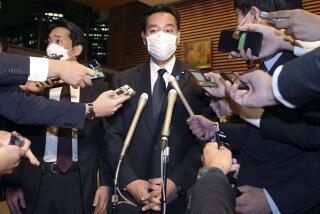Japan Aide Quits Over Remark on WWII
TOKYO — Amid mounting criticism at home and abroad, a member of Prime Minister Noboru Takeshita’s Cabinet resigned Friday over his remark that Japan was not an aggressor in World War II but was fighting Asian colonization by the “white race.”
Seisuke Okuno, who has served in the ministerial post of land agency chief since November, left the Cabinet reluctantly after China and South Korea condemned the comment and opposition parties in Japan demanded his dismissal. But Okuno, a senior member of the ruling Liberal Democratic Party, retains his seat in Parliament, where he is serving his ninth term.
Okuno, 75, who served previously as minister of justice and minister of education, was the third most senior member of the Cabinet, after Takeshita and Finance Minister Kiichi Miyazawa. He was a prefectural director of the Kempeitai, or secret military police, during the war.
Takeshita is scheduled to visit Beijing in August to celebrate the 10th anniversary of the Treaty of Peace and Friendship between the two countries. The furor over Okuno’s remark, and what appeared to be the minister’s unwillingness to retract it, had been expected to place a serious strain on Sino-Japanese relations.
Okuno told reporters Friday that he had resigned under pressure from Takeshita, not because he wished to make any retraction. He blamed the news media for distorting his comment and preventing Asian neighbors from understanding his views.
Takeshita’s cautious handling of the affair suggested that the prime minister was more concerned about resuming normal business in Parliament than in distancing himself from Okuno.
It was the second time in less than two years that a Cabinet minister has been forced to resign because of statements that sought to justify Japan’s military stance.
In September, 1986, Masayuki Fujio was dismissed as minister of education by then-Prime Minster Yasuhiro Nakasone after saying that Korea had willingly accepted colonization by Japan in 1910 and that the 1937 “Rape of Nanjing,” in which Japanese troops slaughtered thousands of Chinese civilians, was just “a part of war.”
Okuno angered critics in Beijing and Seoul when he said after a visit to Tokyo’s Yasukuni Shrine on April 22 that Japan alone was not responsible for starting the war that resulted in millions of Chinese casualties.
“There was no intention of aggression,” Okuno told reporters after visiting the controversial shrine, where many men convicted of war crimes are honored. “The white race had made Asia into a colony, but only Japan has been blamed. Who was the aggressor country? It was the white race. I don’t see why Japanese are called militarists and aggressors.”
Japan’s expansion into China was in fact preceded by a long history of intervention on the continent by Western colonial powers. But Okuno’s remarks were quickly criticized in Beijing. The People’s Daily, the Communist Party newspaper, said in a commentary that Okuno’s comment “concealed the true nature of the war” and that “everybody knows it was the Japanese militarists who triggered the war in Asia and the world.”
The controversy simmered until earlier this week, when Okuno, under questioning by opposition members of Parliament, defied his critics by declaring, “I don’t understand what was inappropriate in the substance of my remarks.”
He qualified his view of history, however, by adding, “I didn’t say Japan wasn’t an aggressor. I said it wasn’t the only aggressor.”
In a news conference Tuesday, Okuno conceded that “it’s true that we caused trouble” in China, but he added: “Many Japanese died. Chinese also died. When you consider this, I don’t want to call it a war of aggression.”
Okuno also brushed aside criticism from South Korea, which was annexed by Japan long before Japanese troops began aggression in China. “I don’t see why South Korea took offense at my remarks,” he said in Parliament on Monday
More to Read
Sign up for Essential California
The most important California stories and recommendations in your inbox every morning.
You may occasionally receive promotional content from the Los Angeles Times.










